English Words in Action, Group F
(a variety of English words which have developed through history and are currently used in our modern age)
Simply click on this banner (or the following link) and you will be on your way to stimulate your brain for greater word comprehension with quizzes based on some of the words in this unit.
There were several crimes in early English law that were punishable by forfeiture of land or property and even by the possible loss of one's life or a part of his or her body.
A felony is sometimes called a "high crime" because it is considered to be more serious. A felony is different from a misdemeanor as far as the amount of punishment a person will receive when convicted.
In the United States, a felony is a crime that has a sentence of more than a year in prison; on the other hand, a year or less in prison signifies that the crime is a minor one which is punishable by a fine or a small jail term; in other words, traffic or parking violations are usually dealt with informally, without a trial.
2. Related to human beings and their bestial or beast-like behavior: There was a ferocious and bloody fight going on in the boxing ring between the two ferine boxers.
3. Etymology: from Latin ferinus, from fera, "wild animal".
2. The name for a domesticated polecat, "Mustela putorius", common in the Old World; such as Europe: The family kept their pet ferrets in a cage during the day when the members of the family were not home.
The ferret has been used for several centuries in Europe, and even earlier in Asia, to hunt rats, mice, and rabbits. The Romans were familiar with the sport, too; and Pliny states that the ferret was used in his time for rabbit hunting. Pliny the Elder, Gaius Plinius Secundus (23–79 AD) was an ancient Roman nobleman, scientist and historian, and author of Naturalis Historia, "Pliny's Natural History".
Domestic ferrets are found in many color types including albinos, brown, and black. The name is also applied to a related wild species, the North American, or black-footed, ferret, "Mustela nigripes", which inhabits the Great Plains and is now extremely rare.
Its range nearly coincides with that of the prairie dogs, which constitute most of its diet; and it is often found in prairie dog burrows.
The severe reduction of the prairie dog population by ranchers is probably partially responsible for the rarity of the black-footed ferret, although it was apparently not numerous when the West was first settled by Europeans.
Ferrets are classified in the phylum Chordata, subphylum Vertebrata, class Mammalia, order Carnivora, and the family Mustelidae (weasel family).
Marcus ferrets out the answers to computer programs and he is considered to be very good at it.
Ingrid's neighbor had two pet ferrets which he used for ferreting rabbits out of their holes in the ground on his farm.
One technique that Adam uses to ferret is by sending his small furry animal with a long tail down a rabbit hole while he holds a container to catch it as it goes out another hole in its attempt to escape.
2. Etymology: in use since about 1398, from Old French fuiret, diminutive (used to express smallness) of fuiron. "weasel, ferret"; literally, "thief"; from Late Latin furionem (related to furonem "cat", and also "robber"); probably from Latin fur, furis, "thief".The verb (from about 1450) refers to the use of half-tame ferrets to kill rats and flush rabbits from burrows; and the extended sense of "to search out, to discover" is from about 1580.
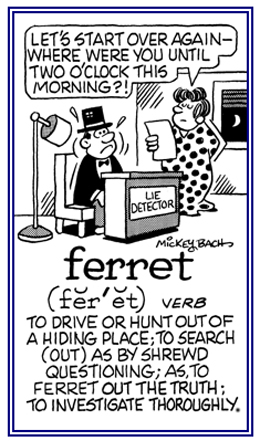
Go to this Word A Day Revisited Index
so you can see more of Mickey Bach's cartoons.
A bus ferries Jane and James back and forth from their home to work every day.
The tourists were ferried across the river by boat to visit the castle.
When more broadly applied, a fetter is anything that confines or restrains.
2. Something which prevents anyone or something from moving or acting freely: Melba desires to be free of the fetters of family obligations.2. To put chains around someone's ankles in order to prevent that person from trying to run away: The convicted prisoner was fettered as he was being moved from the local jail to a prison.
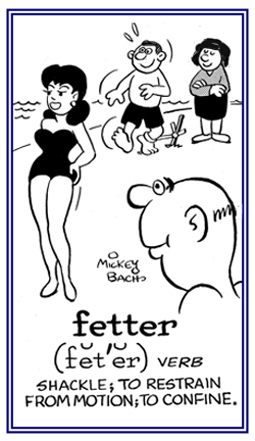
Go to this Word A Day Revisited Index
so you can see more of Mickey Bach's cartoons.
Being fettle also involves being intellectually active and in good spirits instead of being too negative about one's life or the bad things that are going on in the world.
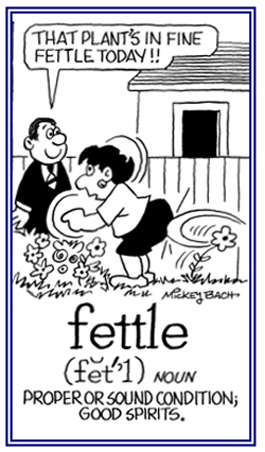
Go to this Word A Day Revisited Index
so you can see more of Mickey Bach's cartoons.
2. A complete and ignominious lack of success to accomplish something: Bill’s efforts to get to the job interview on time became a fiasco when the subway train, on which he relied, stalled in the tunnel.
3. A sudden and violent collapse: The financial failure of the insurance company was a fiasco which no one had anticipated.
4. Etymology: from about 1855, theater slang for "a failure". By about 1862, it acquired the general sense of any "dismal flop", on or off the stage; which may have resulted via a French phrase fiare fiasco, "to turn out a failure", from Italian far fiasco, "suffer a complete breakdown in performance"; or literally, "make a bottle"; from fiasco, "bottle", from medieval Latin flasco which is the source of English flagon and flask.
Fiasco was adopted into English in the late nineteenth century in its newly acquired sense of an "utter and often ridiculous failure".
The reason for all this is unclear today; but "the usual range of fanciful theories has been advanced for the origin of the usage, but none is particularly convincing" according to John Ayto in his Dictionary of Word Origins.
Dr. Ernest Klein in his Klein's Comprehensive Etymological Dictionary of the English Language suggests that "the Venetian glass-makers used only perfectly flawless material for the articles manufactured by them. If in the course of their work the glass showed any flaw, they set it aside to make of it a fiasco, a common bottle or flask."
According to an Italian dictionary, "fare il fiasco once meant, "to play a game so that the one that lost would have to pay the fiasco", in other words, he would buy the next bottle (of wine). That could be one reason for the connection of the word with the notion of "a costly mistake". This idea is presented by Douglas Harper in his Online Etymology Dictionary.
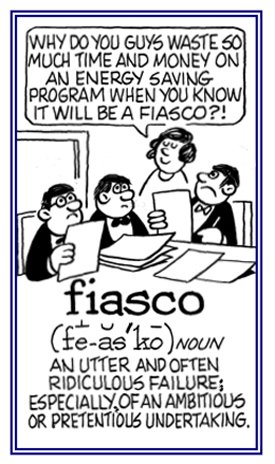

Go to this Word A Day Revisited Index
so you can see more of Mickey Bach's cartoons.
2. Authoritative and often arbitrary commands by someone who has the power to enforce it: The judge sent out judicial fiats requiring witnesses to show up for the trial.
When fickle people are enthusiastic about something on one day, and then the next day they decide that they don't care about it anymore, they are considered to be unreliable and untrustworthy.
Political candidates can be said to be fickle if they frequently change their positions on issues, which seems to happen quite often.
2. Characteristic of having one opinion now and then an opposite one for erratic or unstable reasons; especially, when something is often done inconsistently: Nolan blames poor sales for his business this month on fickle consumers who request that he obtain and have certain items available and then they never come back to buy them.3. Relating to situations becoming suddenly different and unexpected: Sam was complaining about the fickle weather which was very pleasant in the morning and then quickly became stormy in the afternoon.
4. Etymology: from Middle English fikel, which came from Old English ficol, "deceitful, tricky".
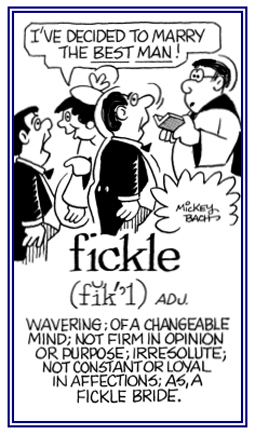
Go to this Word A Day Revisited Index
so you can see more of Mickey Bach's cartoons.
2. To obtain something by crafty methods or dishonest methods: The government is investigating shady stockbrokers who finagle their clients out of fortunes.
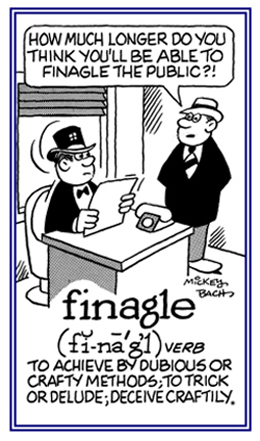
Go to this Word A Day Revisited Index
so you can see more of Mickey Bach's cartoons.
2. Those who obtain something by dishonest or devious methods: Two finaglers tried to get invitations or admissions to the special conference by claiming to be reporters.
2. Concerning something which arouses suspicion or doubt: Tom’s father said, “I just don’t believe you, Tom. Your excuse sounds very fishy to me!”
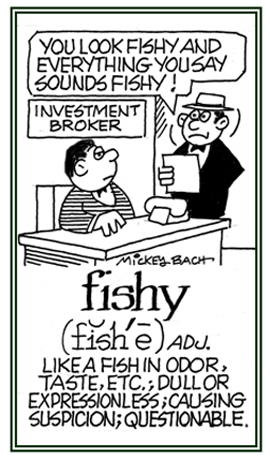
Go to this Word A Day Revisited Index
so you can see more of Mickey Bach's cartoons.
Links to all of the groups of English words in action, Groups A to Z.
You may see the bibliographic list of sources of information for these words in action.


